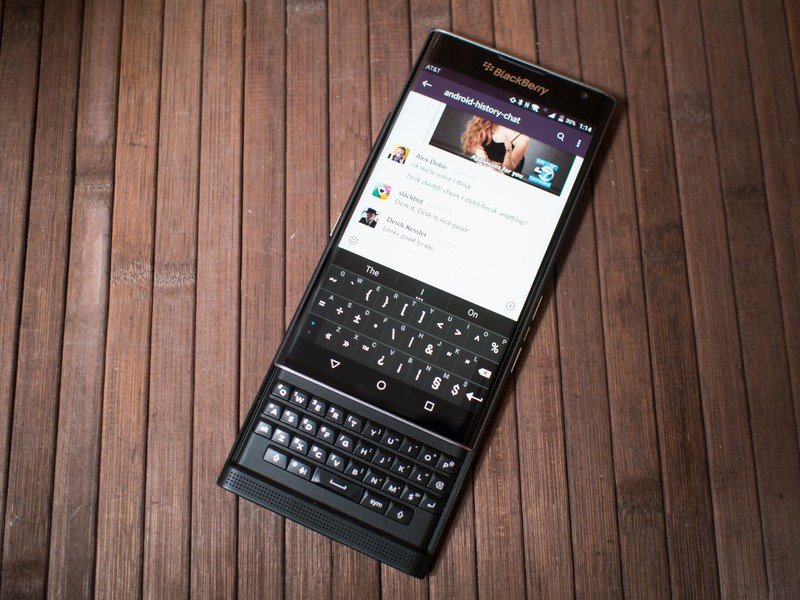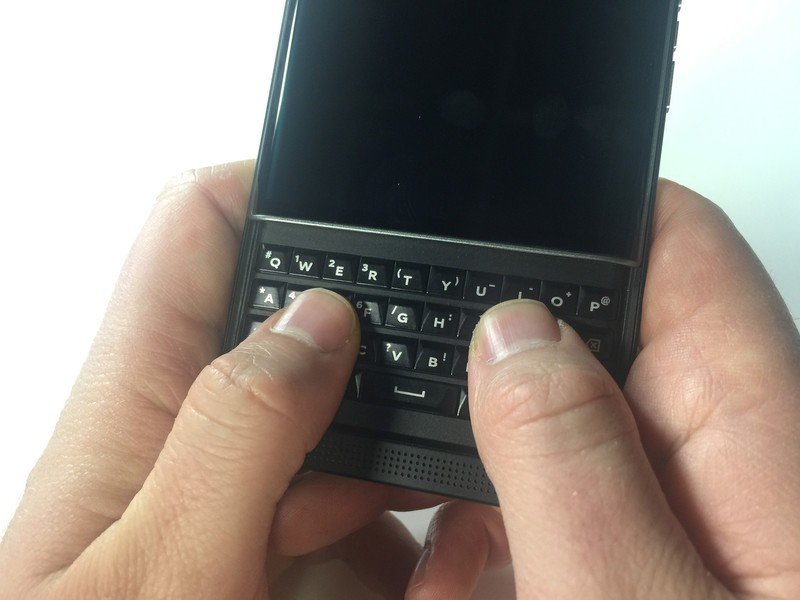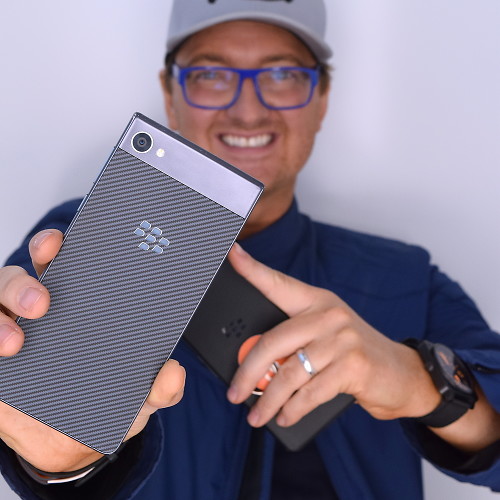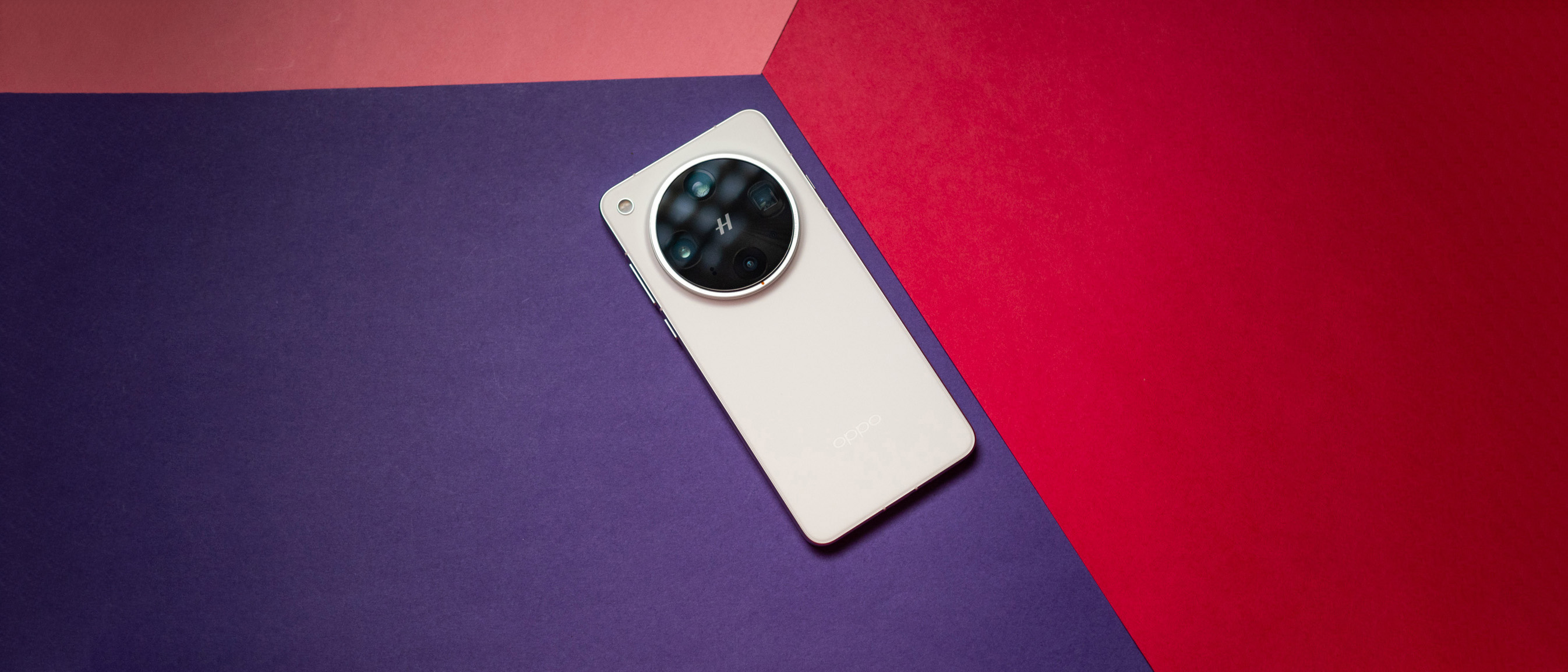Don't laugh: 10 reasons why physical keyboards on phones still rock

As we recently highlighted in our History of Android series, in the early days of Android it wasn't uncommon to see a physical keyboard. At that time, BlackBerry was still the number one smartphone maker in the world and the touch-only iPhone was still proving itself, so Android phones like the T-Mobile G1 and original Droid went the BlackBerry route and shipped with physical keyboards.
Rather quickly, Android handset manufacturers pivoted, ditching physical keyboards in favor of full touch slabs, and we have seen very few exceptions to that rule in the years since. In the past several years, practically every Android phone that tried to come to market with a keyboard failed to gain traction.
What goes around apparently comes around, and as we near the end of 2015 we're suddenly talking about physical keyboards on Android phones again. Samsung, surprisingly, brought back the hardware keyboard to their Note 5 and Galaxy S6 Edge + in the form of an accessory that clips onto the phone. Making an even bigger commitment to the physical keyboard, BlackBerry has released the BlackBerry Priv which features a physical keyboard you can slide out at anytime under a big 5.4-inch display.
We live in a phone world where more people have typed on glass than have ever typed on physical keys
Clearly these companies feel there is still a market demand for a physical keyboard, and as we found out from our interview with BlackBerry's President of Devices, they believe this a growth opportunity and not just catering to longtime keyboard users. One thing I've found interesting in the many conversations I've had recently about the Priv is the lack of understanding about the benefits of a physical keyboard, both among smartphone enthusiasts and more casual smartphone users.
I get it. We now live in a phone world where more people have typed on glass than have ever typed on buttons. Even those of us, myself included, who have transitioned from a physical keyboard to touchscreen can actually type faster on a touchscreen than we ever could on a physical keyboard.
So if it's not flat-out fast typing speed that makes a physical keyboard desirable, why would you even want to get a phone like the Priv where you can slide out a keyboard with buttons?
In no particular order, here are my top reasons why you shouldn't laugh when you see someone using a physical keyboard on a phone:
Be an expert in 5 minutes
Get the latest news from Android Central, your trusted companion in the world of Android

1. Whether you're moving, walking, or riding in a car, physical keyboards are faster and more accurate when you're "doing stuff".
When I'm standing or sitting still, I'm typically faster on a touchscreen keyboard than on a physical keyboard. But start typing while I'm in motion and the physical keyboard is far more likely to win the typing race. Walking down the street with phone in hand, I can put my head down and pump out the messages with gusto on a physical keyboard. Having physical buttons for your fingers to push increases dexterity and ensures your button presses are accurate.
Physical buttons for your fingers to push increases dexterity and ensures your button presses are accurate
On a touchscreen it's hard to tap or swipe as accurately while your body is in motion. When stationary you don't even have to think about your thumbs in relation to the smartphone that's sitting still in your hands. When you're out-and-about, your thumbs have to hit small targets on a moving platform. Simply put, it's harder. Doesn't matter whether we're talking about walking around or riding in the back seat of a taxi — the physical keyboard rules the motion environment.
2. Muscle memory means you can learn to type without even looking

You've gotta love muscle memory! If you log enough hours on a physical keyboard, you'll find yourself being able to type on it pretty much without even having to look at it. Most are already that way with a desktop keyboard — if you spend any time at a computer, you left hunt-and-peck in the past years ago. Typing on a touchscreen is different. Your fingers have no tactile reference points on a sheet of glass. You need actually look at what you're doing and focus, even if subconsciously, on where your fingers are. Without doing that, it's just too easy to tap in the wrong spot and run your sentence into a string of nonsensical characters (especially once autocorrect starts to kick in). Touchscreen keyboards require concentration that a physical keyboard just does not.
Depending on who you are and what you do for a living, the benefit of being able to type on your smartphone accurately while only paying minimal attention to it as a BIG one.
3. Easier typing for long fingernails
For those of us with longer fingernails, physical keyboards are more fingernail friendly. Touchscreen keyboards demand contact with flesh to register the touch, and a fingernail just won't do — so those with long fingernails found they had to resort to awkward flat-thumbing to type on glass. But with a physical keyboard your options are open — type with the pads of your thumbs, with the tips of your fingernails, with whatever — so long as you can push down the key, you're good. BlackBerry's customer base skewed female for many years, partly due to this built-in advantage for physical keyboards.
4. Better accuracy for older fingers
As your fingers slow down with age and your eyesight begins to wane, the instant response of a touchscreen tap can become hard to manage. With a physical keyboard you can get your fingers firmly on the right button, then press down with confidence. There is also the matter of familiarity — a physical keyboard on a smartphone is a rather direct translation of the QWERTY keyboards we've been using for decades on typewriters and computers. Touchscreen keyboards use a similar layout, but the concept is not necessarily a familiar one.
Again, this may not apply to everyone, but I've found a preference among the older people in my life for physical keyboards. For both my mom and mother-in-law, who I have furnished with both touchscreen and physical keyboard phones over the years, their preference has been for the physical keyboard.
5. Easier to type passwords, proper names, URLs, email addresses, etc.
If you type a lot of passwords and proper names, etc. all day long on your phone, you'll likely find a keyboard faster and more accurate for getting this done, especially with auto-correct getting out of your way.
6. Physical keyboards give you physical shortcuts to apps, contacts, and more
For power users and power communicators who care more about utility than simplicity and design aesthetic, a (properly implemented) physical keyboard offers productivity benefits. Being able to dial contacts directly with the quick press and hold of a button, or launch into apps or universal search can save seconds every time you pick up your phone. Of course, the software on the phone needs to support that, and it just so happens the BlackBerry Priv does.
7. Less embarrassment when you re-read messages you sent the night before while drinking

I can confirm from years of personal experience that drunk texts come out more accurately when delivered via a physical keyboard
For many of us, drinking and texting happens. And somehow the more you drink, the more difficult it becomes to be for the intended recipient of your messages to figure out what you're trying to say. It's a mystery science will never be able to solve. From many years of personal experience battling with this, I can confirm that drunk texts tend to come out more accurately when delivered via a physical keyboard.
8. It feels like you're dancing with your fingers!
One of the benefits of a touchscreen is that it's effortless and it doesn't make any noise (both good things when you're lying in bed using your phone and trying not to wake your significant other). The disadvantage to this though is that there's a lack of feel in the typing experience compared to a good physical keyboard, where you can really develop a rhythm while typing that is extremely satisfying. Your fingers literally dance off the keys. This doesn't just apply to smartphones of course, but to computer keyboards as well. I'm an extremely fast typer at the computer when I get into the zone. And the same is the case on a physical keyboard on the phone. I don't just type on a physical keyboard, I have a relationship with it.
Your fingers literally dance off the keys
Sure, that's kind of arbitrary and a personal thing, but there's something to be said for getting real tactile feedback (looking at you, Apple "taptic" engine) from your device.
9. BlackBerry Priv Bonus: more screen real estate when typing
When Steve Jobs announced the iPhone, he made a very correct argument: physical keyboards on the front of a phone took up a lot of space that could have been used for the display. "Why have a keyboard present if you often don't need it?" he asked. But we can flip that argument on its head: now when you're typing the keyboard takes up half of your available screen real estate, and when you're on what's today a small phone like the iPhone 6s, that's not leaving you with a lot of space. Suddenly you're only able to see a small portion of your conversation in SnapChat or WhatsApp or Facebook Messenger.
But a slider physical keyboard like the BlackBerry Priv? It has no such issues. Sure, you can use the software keyboard on it if you really want to, but with a satisfyingly snappy slide up, you've got both a physical keyboard and the entirety of your display at your disposal.
10. BlackBerry Priv Bonus - Gesture control for scrolling and cursor placement
BlackBerry first implemented this feature with the Passport and they've carried it over to the Priv: the "gesture keyboard". That's to say that the keys themselves are touch sensitive and you can swipe over them to scroll the app you're looking at or move around a cursor in text. Instead of smudging up your touchscreen scrolling through long webpages or your inbox or Twitter feeds, you can scroll a lot with short swipes on the keyboard. Or when it comes to trying to get the cursor into the perfect spot in a long string of text, you can drag your finger across the keyboard and get it easily placed without the fuss of your finger blocking the screen you need to see to place the cursor.
Which of these reasons resonate with you?
The last couple of years I've been living on full touchscreen phones. I dabbled with some of the new keyboard-equipped BlackBerry phones when they came out, but ultimately also always had a full touch device in my other pocket. Despite a long smartphone history with physical keyboards, I've adjusted to typing on glass and mainly forgot about the benefits that a physical keyboard can bring. I'm excited for the BlackBerry Priv though, as it's bringing forward a design with minimal compromise: a full screen touch experience and a keyboard I can snap out for those moments when I need it. What I've found even more exciting is that the experts here on Android Central are liking the keyboard implementation on the Priv. As Russell Holly noted in Android Central's BlackBerry Priv Review, the presence of the physical keyboard actually enhances the software experience of Android.
If you used a keyboard back in the day, I'm sure at least one or two of the points above resonated with you. And maybe those of you that have never tried a physical keyboard smartphone see something to my logic — there are ways in which it's simply better. Physical keyboard fans and potential converts, drop your own reasons in the comments.
I've been writing about physical keyboards for a while — in fact, I'm reiterating some of my points from an editorial I wrote nearly two years ago, and a year before that during Talk Mobile: Buttons vs. Pixels, The Great Keyboard Debate.

